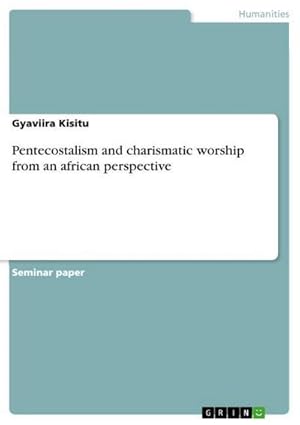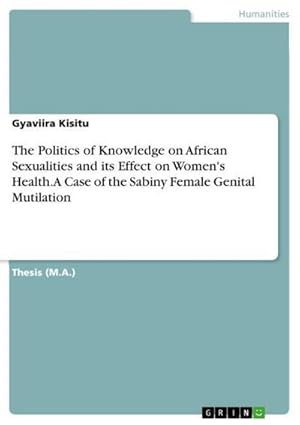kisitu gyaviira (2 Ergebnisse)
Produktart
- Alle Produktarten
- Bücher (2)
- Magazine & Zeitschriften
- Comics
- Noten
- Kunst, Grafik & Poster
- Fotografien
- Karten
-
Manuskripte &
Papierantiquitäten
Zustand
- Alle
- Neu
- Antiquarisch/Gebraucht
Einband
- alle Einbände
- Hardcover
- Softcover
Weitere Eigenschaften
- Erstausgabe
- Signiert
- Schutzumschlag
- Angebotsfoto
Land des Verkäufers
Verkäuferbewertung
-
Pentecostalism and charismatic worship from an african perspective
Verlag: GRIN Verlag, 2016
ISBN 10: 3668114463ISBN 13: 9783668114463
Anbieter: AHA-BUCH GmbH, Einbeck, Deutschland
Buch
Taschenbuch. Zustand: Neu. Druck auf Anfrage Neuware - Printed after ordering - Seminar paper from the year 2015 in the subject Theology - Systematic Theology, University of KwaZulu-Natal (Religion philosophy and classics), course: Masters, language: English, abstract: Scholarship on Pentecostalism and charismatic forms of worship has described Pentecostal and Charismatic churches in African as part of 'a rapidly growing form of African Christianity;' that as a movement, 'it is fast becoming one of the most significant expressions of Christianity on the continent.'( Anderson, 2001:167). This growth can be identified with many factors. Among these, is the issue of biblical interpretation, which compared to the mainline churches follows, distinct approaches. Despite this growth, the way in which most Pentecostal interpretations extract meanings from the text also points to certain hermeneutical challenges. Some of these challenges have been expressed in Herholdt (1998) model of Biblical hermeneutics. This work attempts to discuss two of Herholdt facets model of hermeneutics. It points out how hermeneutics has come to be singled out as one of challenges faced by these churches. An attention has been put on how these models may have contributed to the rapid growth of Pentecostalism and how still they can pose a challenge to sustain the currently experienced growth.
-
The Politics of Knowledge on African Sexualities and its Effect on Women's Health. A Case of the Sabiny Female Genital Mutilation
Verlag: GRIN Verlag, 2016
ISBN 10: 366812597XISBN 13: 9783668125971
Anbieter: AHA-BUCH GmbH, Einbeck, Deutschland
Buch
Taschenbuch. Zustand: Neu. Druck auf Anfrage Neuware - Printed after ordering - Thesis (M.A.) from the year 2015 in the subject Women Studies / Gender Studies, University of KwaZulu-Natal, course: Masters, language: English, abstract: The purpose of this study was to understand 'What knowledge matters', and 'Whose knowledge matters' in the study of African sexuality and in particular female genital circumcision. The Sabiny peoples of Uganda practice the tradition of wonsetapkoruk or wosho as a rite of initiation for girls. This practice is elsewhere understood as female genital cutting, female genital circumcision or female genital mutilation.Discussions on African sexuality and female genital circumcision have taken either a Western perspective or an African point of view. Since the practice is understood differently, the values attached to it differ as a consequence of the wide range of opinions. In certain ways it is considered as a determinant of who has a normal sexuality or a normal body; distinguishes girls from women; confers true femininity as opposed to masculinity. Amidst these discussions, the aspect of women's health is peripheral and marginalized. Instead discussions seem to be limited by issues of language, naming, and standpoints by which various bodies of knowledge argue their different positions. Communication between the various sides of the debate is also minimal. Despite the claims that female genital circumcision is harmful to women's health attempts to eradicate it are faced by resistances. Through an African feminist approach to the politics of knowledge on African sexualities, in this study I argue that the discourses on African sexualities and in particular those on female genital circumcision affect the understanding of women's health. Second, the different approaches employed in the discussions of female genital circumcision evaluate the practice using different scales of values which affect the understanding of health through what they neglect or take for granted.



